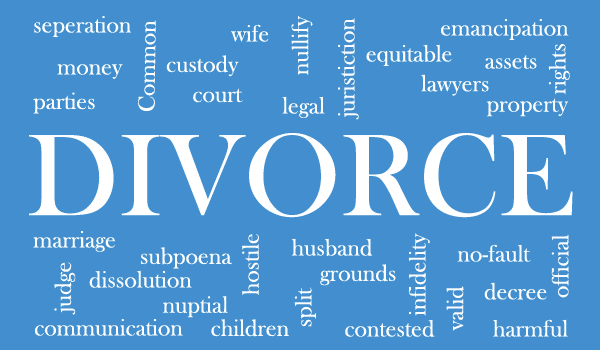Common Divorce Terms

Alimony:
Payment of support (not child support) from one spouse to another so that the spouse receiving the payment can maintain the lifestyle that he/she was accustomed to during the marriage. Also called spousal support or maintenance.
Annulment:
The legal ending of an 'Invalid Marriage'. To the law neither party was ever married, but all the children born of the annulled marriage remain legitimate.
Arrearages:
The difference between the amount of alimony or child support paid, if any, and the amount required under court order.
Child Support:
The amount of money that the non-custodial parent pays to the custodial parent to help pay for the every day needs of the child(ren) such as housing, food and clothing.
Child Support Guidelines:
The amount of child support to be paid, under normal circumstances, according to a schedule established by the state, based upon income. It is federally mandated that all states establish guidelines for child support.
Common Law Marriage:
A judicially-recognized marriage in some states, usually based on cohabitation.
Community Property:
A rule of property division which divides equally all property acquired during the term of the marriage, without regard to whose name it is held. Inheritances and gifts are excluded in some jurisdictions.
Complaint:
The formal document filed with the Court which states that the plaintiff wants a divorce and why.
Contested Divorce:
The party sued opposes the because either : she/he denies the asserted grounds or he/she does not agree with the suing party as to the terms of the divorce i.e. property, child custody, child support, alimony, assumption of marital debts etc.
Court Order:
A written instruction from the court carrying the weight of law. Orders must be in writing. Anyone who knowingly violates a court order can be held in contempt of court.
Defendant:
The person (either husband or wife) who is being sued for divorce.
Deposition:
Where a party or witness is asked questions orally before a court reporter
Equitable Distribution:
The division of the property (marital assets) acquired during the marriage. Marital debts can also be part of the equitable distribution.
Grounds:
The reason(s) under state statute for granting a divorce.
Interrogatory:
Written questions asked by one party of an opposing party, who must answer them in writing under oath.
Irreconcilable Differences:
Irreconcilable Differences is the only grounds for a "no fault" divorce in Tennessee. It is "no fault" because, neither spouse is found to have caused the irreconcilable differences and the specific differences does not need to be proven. The spouses simply agree that the difference exist and cannot be reconciled.
Marital Assets:
All property acquired during the course of the marriage regardless of who owns or has title to it. It includes but is not limited to the following: house(s), other real estate, cash, stocks, bonds, motor vehicles, pensions, profit sharing plans and insurance.
Marital Dissolution Agreement:
A Marital Dissolution Agreement spells out the terms of the divorce and the relationship between the two spouses after the divorce. These agreements usually cover property division, debt division, spousal support, and other relevant issues related to the divorce.
Marital Dissolution Agreements are required in order to obtain an uncontested divorce on the grounds of Irreconcilable Differences. Marital Dissolution Agreements lay out all of the terms of the agreement in writing, there are no ambiguities.
Mediation:
Process by which you work with a neutral third party to reach an agreement.
Motion:
A request for some type of action or decision to be made by the court.
Nuptial:
Pertaining to marriage.
Pendente Lite Support:
A temporary order of the Court which provides support until the divorce is finalized.
Plaintiff:
The person (husband or wife) who files the divorce complaint and sues the person for divorce.
Primary Residential Parent:
The parent with whom the child(ren) live the majority of the time with.
Pro Se:
To represent yourself in court proceedings without an attorney.
QDRO:
Qualified Domestic Relations Order. A ruling by the court stating what portion of one spouse's pension/retirement is to be awarded to the other spouse.
Quid Pro Quo:
The giving of one valuable thing for another.
Restraining Order:
A court order prohibiting a party from certain activities. Issued in response to a motion. Restraining orders often are issued to protect marital assets and to protect against domestic violence. In many states, violating a "domestic restraining order" is a criminal offense.
Spousal Support:
See Alimony
Subpoena:
A court order to attend a legal proceeding such as a trial or deposition. If documents are also requested, the subpoena is called a subpoena duces tecum, Latin for "bring with you." Sometimes a subpoena duces tecum states that you must produce certain documents by a specific date without having to appear.
Uncontested Divorce:
An uncontested divorce is one in which both parties agree to the divorce and the terms of the settlement, without the expense and animosity associated with going to trial. The parties agree to the grounds for divorce. Irreconcilable difference is the legal term for the grounds in an uncontested divorce. Irreconcilable differences divorces are "no fault" divorces. Both parties agree that the problems in the marriage are problems which cannot be overcome and are severe enough that they can no longer live together as husband and wife.
The Court in almost all cases will approve an agreement reached by spouses. However, any agreement must be fair and reasonable. Each spouse must either have an attorney or be given the opportunity to have an attorney. Any coercion, undue influence or fraud can invalidate the agreement.
If you and your spouse cannot agree on all issue, your divorce is by definition contested. Contested divorces often involve complex legal issues, high financial stakes and technical legal procedures in court. Therefore, we cannot do contested divorces online.

